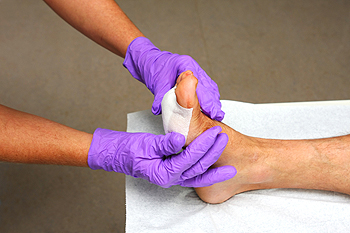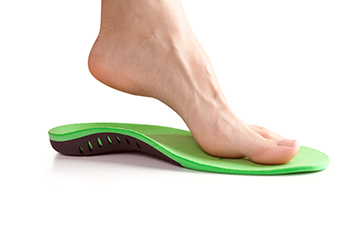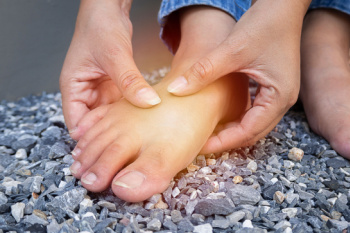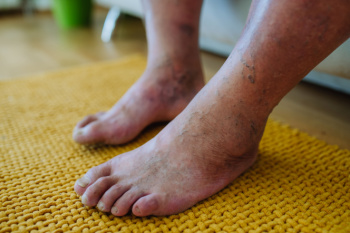June 2024
Treatment for Post-Traumatic Wounds of the Foot
 Post-traumatic wounds over the top part of the foot are injuries that occur after a traumatic event, such as an accident or severe impact. These wounds can be caused by cuts, crush injuries, or severe abrasions. When they happen, it is essential to treat them properly to prevent complications like infection or poor healing. Handling these wounds involves cleaning and dressing them to prevent infection. In more severe cases, where the skin and tissue are significantly damaged, podiatrists may use skin grafts, local tissue flaps, or free flaps for reconstruction. Skin grafts involve taking healthy skin from another part of the body to cover the wound, but they might not be as durable in the long term. Local or distant flaps are often preferred because they provide better long-term results and lower chances of permanent tightening of the skin. Reconstruction should focus on maintaining the foot's form, function, and appearance. If you have sustained such an injury, it is suggested that you schedule an appointment with a podiatrist for individualized treatment to achieve the best outcome.
Post-traumatic wounds over the top part of the foot are injuries that occur after a traumatic event, such as an accident or severe impact. These wounds can be caused by cuts, crush injuries, or severe abrasions. When they happen, it is essential to treat them properly to prevent complications like infection or poor healing. Handling these wounds involves cleaning and dressing them to prevent infection. In more severe cases, where the skin and tissue are significantly damaged, podiatrists may use skin grafts, local tissue flaps, or free flaps for reconstruction. Skin grafts involve taking healthy skin from another part of the body to cover the wound, but they might not be as durable in the long term. Local or distant flaps are often preferred because they provide better long-term results and lower chances of permanent tightening of the skin. Reconstruction should focus on maintaining the foot's form, function, and appearance. If you have sustained such an injury, it is suggested that you schedule an appointment with a podiatrist for individualized treatment to achieve the best outcome.
Wound care is an important part in dealing with diabetes. If you have diabetes and a foot wound or would like more information about wound care for diabetics, consult with Dr. Stephen Petrofsky from Florida. Our doctor will assess your condition and provide you with quality foot and ankle treatment.
What Is Wound Care?
Wound care is the practice of taking proper care of a wound. This can range from the smallest to the largest of wounds. While everyone can benefit from proper wound care, it is much more important for diabetics. Diabetics often suffer from poor blood circulation which causes wounds to heal much slower than they would in a non-diabetic.
What Is the Importance of Wound Care?
While it may not seem apparent with small ulcers on the foot, for diabetics, any size ulcer can become infected. Diabetics often also suffer from neuropathy, or nerve loss. This means they might not even feel when they have an ulcer on their foot. If the wound becomes severely infected, amputation may be necessary. Therefore, it is of the upmost importance to properly care for any and all foot wounds.
How to Care for Wounds
The best way to care for foot wounds is to prevent them. For diabetics, this means daily inspections of the feet for any signs of abnormalities or ulcers. It is also recommended to see a podiatrist several times a year for a foot inspection. If you do have an ulcer, run the wound under water to clear dirt from the wound; then apply antibiotic ointment to the wound and cover with a bandage. Bandages should be changed daily and keeping pressure off the wound is smart. It is advised to see a podiatrist, who can keep an eye on it.
If you have any questions, please feel free to contact our office located in Port Charlotte, FL . We offer the newest diagnostic and treatment technologies for all your foot care needs.
Orthotics Can Help With New Shoes
 Orthotics can significantly alleviate first-step pain often experienced with new shoes by providing customized support and cushioning for the feet. These devices are designed to fit the contours of the foot precisely, reducing stress on the plantar fascia, which is often the source of discomfort. When new shoes lack adequate arch support or cushioning, the plantar fascia can become strained, leading to pain. Orthotics help distribute pressure more evenly across the foot, minimizing the impact on sensitive areas. They also enhance the alignment and function of the foot, promoting a more natural gait and reducing the likelihood of further strain. The materials used in orthotics, such as gel or foam, provide additional shock absorption, making each step less painful. If you are experiencing persistent or severe first-step pain, it is suggested that you consult a podiatrist to discuss whether orthotics can help you and to address any underlying foot conditions.
Orthotics can significantly alleviate first-step pain often experienced with new shoes by providing customized support and cushioning for the feet. These devices are designed to fit the contours of the foot precisely, reducing stress on the plantar fascia, which is often the source of discomfort. When new shoes lack adequate arch support or cushioning, the plantar fascia can become strained, leading to pain. Orthotics help distribute pressure more evenly across the foot, minimizing the impact on sensitive areas. They also enhance the alignment and function of the foot, promoting a more natural gait and reducing the likelihood of further strain. The materials used in orthotics, such as gel or foam, provide additional shock absorption, making each step less painful. If you are experiencing persistent or severe first-step pain, it is suggested that you consult a podiatrist to discuss whether orthotics can help you and to address any underlying foot conditions.
If you are having discomfort in your feet and would like to try orthotics, contact Dr. Stephen Petrofsky from Florida. Our doctor can provide the care you need to keep you pain-free and on your feet.
What Are Orthotics?
Orthotics are inserts you can place into your shoes to help with a variety of foot problems such as flat feet or foot pain. Orthotics provide relief and comfort for minor foot and heel pain but can’t correct serious biomechanical problems in your feet.
Over-the-Counter Inserts
Orthotics come in a wide variety of over-the-counter inserts that are used to treat foot pain, heel pain, and minor problems. For example, arch supports can be inserted into your shoes to help correct overarched or flat feet, while gel insoles are often used because they provide comfort and relief from foot and heel pain by alleviating pressure.
Prescription Orthotics
If over-the-counter inserts don’t work for you or if you have a more severe foot concern, it is possible to have your podiatrist prescribe custom orthotics. These high-quality inserts are designed to treat problems such as abnormal motion, plantar fasciitis, and severe forms of heel pain. They can even be used to help patients suffering from diabetes by treating foot ulcers and painful calluses and are usually molded to your feet individually, which allows them to provide full support and comfort.
If you are experiencing minor to severe foot or heel pain, it’s recommended to speak with your podiatrist about the possibilities of using orthotics. A podiatrist can determine which type of orthotic is right for you and allow you to take the first steps towards being pain-free.
If you have any questions please contact our office located in Port Charlotte, FL . We offer the newest diagnostic and treatment technologies for all your foot and ankle needs.
It's Time for Beautiful Feet
Lupus and the Feet
 Lupus, an autoimmune disease, can significantly affect the bones, joints, and muscles in the feet, leading to various complications. This condition causes the immune system to attack healthy tissues, resulting in inflammation and damage. In the feet, lupus commonly leads to arthritis, causing joint pain, swelling, and stiffness. Tendonitis, an inflammation of the tendons, is also frequent, causing pain and difficulty in movement. Additionally, tendon laxity, or the loosening of tendons, can occur, causing instability and increasing the risk of sprains. One severe complication of lupus is avascular necrosis, where reduced blood flow to the bones leads to bone tissue death. This condition can cause severe pain and lead to bone collapse if untreated. Managing lupus symptoms requires early intervention and proper care. If you have this disease and are experiencing foot-related issues, it is strongly suggested that you schedule an appointment with a podiatrist for personalized treatment and to address your specific problems.
Lupus, an autoimmune disease, can significantly affect the bones, joints, and muscles in the feet, leading to various complications. This condition causes the immune system to attack healthy tissues, resulting in inflammation and damage. In the feet, lupus commonly leads to arthritis, causing joint pain, swelling, and stiffness. Tendonitis, an inflammation of the tendons, is also frequent, causing pain and difficulty in movement. Additionally, tendon laxity, or the loosening of tendons, can occur, causing instability and increasing the risk of sprains. One severe complication of lupus is avascular necrosis, where reduced blood flow to the bones leads to bone tissue death. This condition can cause severe pain and lead to bone collapse if untreated. Managing lupus symptoms requires early intervention and proper care. If you have this disease and are experiencing foot-related issues, it is strongly suggested that you schedule an appointment with a podiatrist for personalized treatment and to address your specific problems.
When dealing with systemic disease of the feet, it is extremely important to check the affected areas routinely so that any additional problems are caught quickly. If you have any concerns about your feet and ankles contact Dr. Stephen Petrofsky from Florida. Our doctor will assist you with all of your podiatric needs.
Systemic Diseases of the Feet
Systemic diseases affect the whole body, and symptoms usually are displayed in the feet. This condition can make a patient’s ability to walk unbearable. Systemic diseases include gout, diabetes mellitus, neurological disorders, and arthritis.
Gout – is caused by an excess of uric acid in the body. Common symptoms include pain, inflammation, and redness at the metatarsal/phalangeal joint of the base big toe. Gout can be treated by NSAIDs to relieve pain and inflammation, and other drugs that lower the acid levels in the body.
Diabetes mellitus – is an increase in the level of blood sugar that the body cannot counteract with its own insulin. Failure to produce enough insulin is a factor in Diabetes.
Diabetes of the Feet
Diabetic Neuropathy – may lead to damaged nerves and affect the feet through numbness and loss of sensation.
Peripheral Vascular Disease – can restrict the blood flow to the feet, and often times lead to amputation of the feet.
If you have any questions please feel free to contact our office located in Port Charlotte, FL . We offer the newest diagnostic and treatment technologies for all your foot and ankle needs.
Infection From Diabetic Foot Ulcers
 Foot infections from diabetes often stem from foot ulcers, open sores that develop due to poor circulation, and nerve damage linked to diabetes. If not properly managed, these ulcers can become infected and lead to serious health risks. Prevention is vital and involves maintaining stable blood sugar levels to enhance circulation and nerve function. Regular foot inspections are needed to catch ulcer formation early. Prevention strategies include daily foot cleaning and careful observation to identify changes before they worsen. Wearing appropriate footwear that reduces pressure points can also help prevent ulcers. Podiatrists, or foot doctors, also play an important role in diabetic foot care. These doctors can conduct regular check-ups to detect potential problems, recommend diabetic shoes, and teach proper foot care techniques. They will ensure that any foot concerns are addressed promptly. If you are at risk for diabetic foot ulcers or suspect a foot ulcer, it is suggested that you schedule an appointment with a podiatrist today.
Foot infections from diabetes often stem from foot ulcers, open sores that develop due to poor circulation, and nerve damage linked to diabetes. If not properly managed, these ulcers can become infected and lead to serious health risks. Prevention is vital and involves maintaining stable blood sugar levels to enhance circulation and nerve function. Regular foot inspections are needed to catch ulcer formation early. Prevention strategies include daily foot cleaning and careful observation to identify changes before they worsen. Wearing appropriate footwear that reduces pressure points can also help prevent ulcers. Podiatrists, or foot doctors, also play an important role in diabetic foot care. These doctors can conduct regular check-ups to detect potential problems, recommend diabetic shoes, and teach proper foot care techniques. They will ensure that any foot concerns are addressed promptly. If you are at risk for diabetic foot ulcers or suspect a foot ulcer, it is suggested that you schedule an appointment with a podiatrist today.
Diabetic foot care is important in preventing foot ailments such as ulcers. If you are suffering from diabetes or have any other concerns about your feet, contact Dr. Stephen Petrofsky from Florida. Our doctor can provide the care you need to keep you pain-free and on your feet.
Diabetic Foot Care
Diabetes affects millions of people every year. The condition can damage blood vessels in many parts of the body, especially the feet. Because of this, taking care of your feet is essential if you have diabetes, and having a podiatrist help monitor your foot health is highly recommended.
The Importance of Caring for Your Feet
- Routinely inspect your feet for bruises or sores.
- Wear socks that fit your feet comfortably.
- Wear comfortable shoes that provide adequate support.
Patients with diabetes should have their doctor monitor their blood levels, as blood sugar levels play such a huge role in diabetic care. Monitoring these levels on a regular basis is highly advised.
It is always best to inform your healthcare professional of any concerns you may have regarding your feet, especially for diabetic patients. Early treatment and routine foot examinations are keys to maintaining proper health, especially because severe complications can arise if proper treatment is not applied.
If you have any questions please feel free to contact our office located in Port Charlotte, FL . We offer the newest diagnostic and treatment technologies for all your foot and ankle needs.









